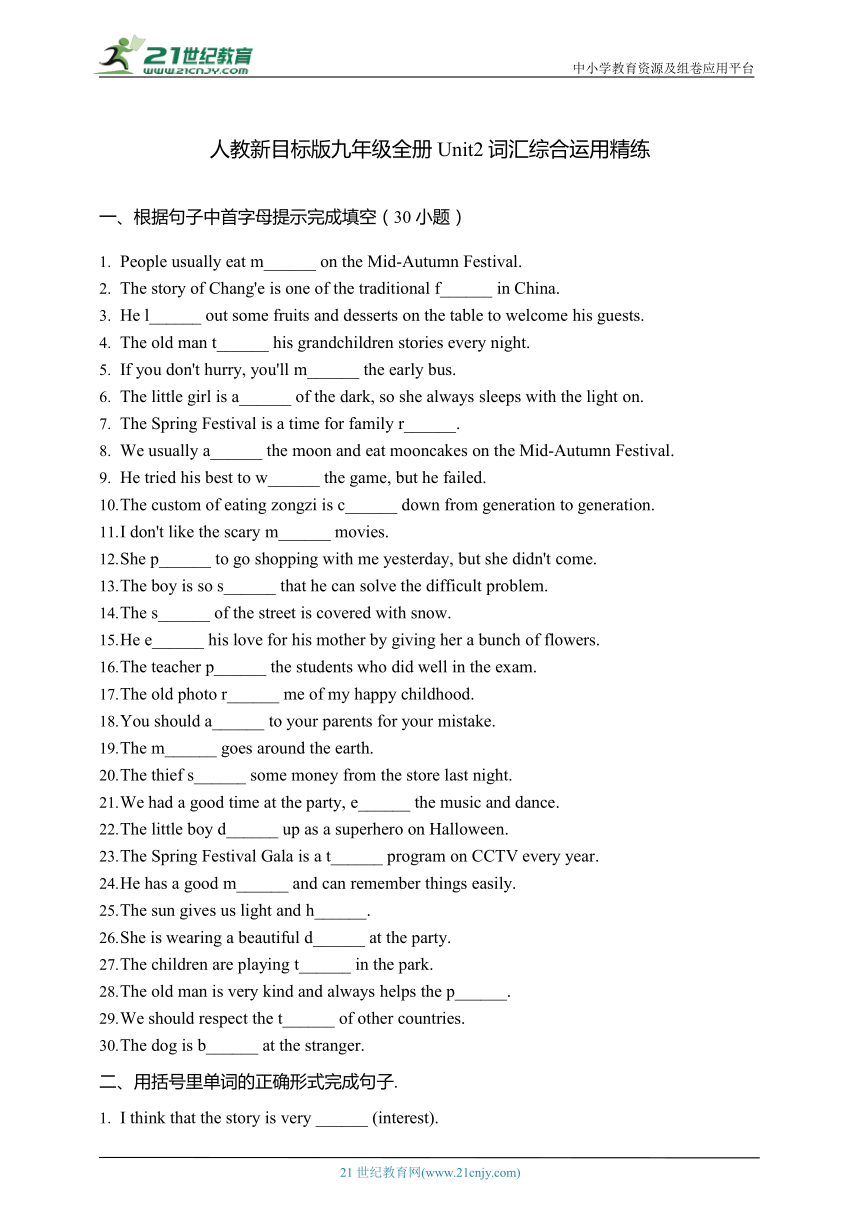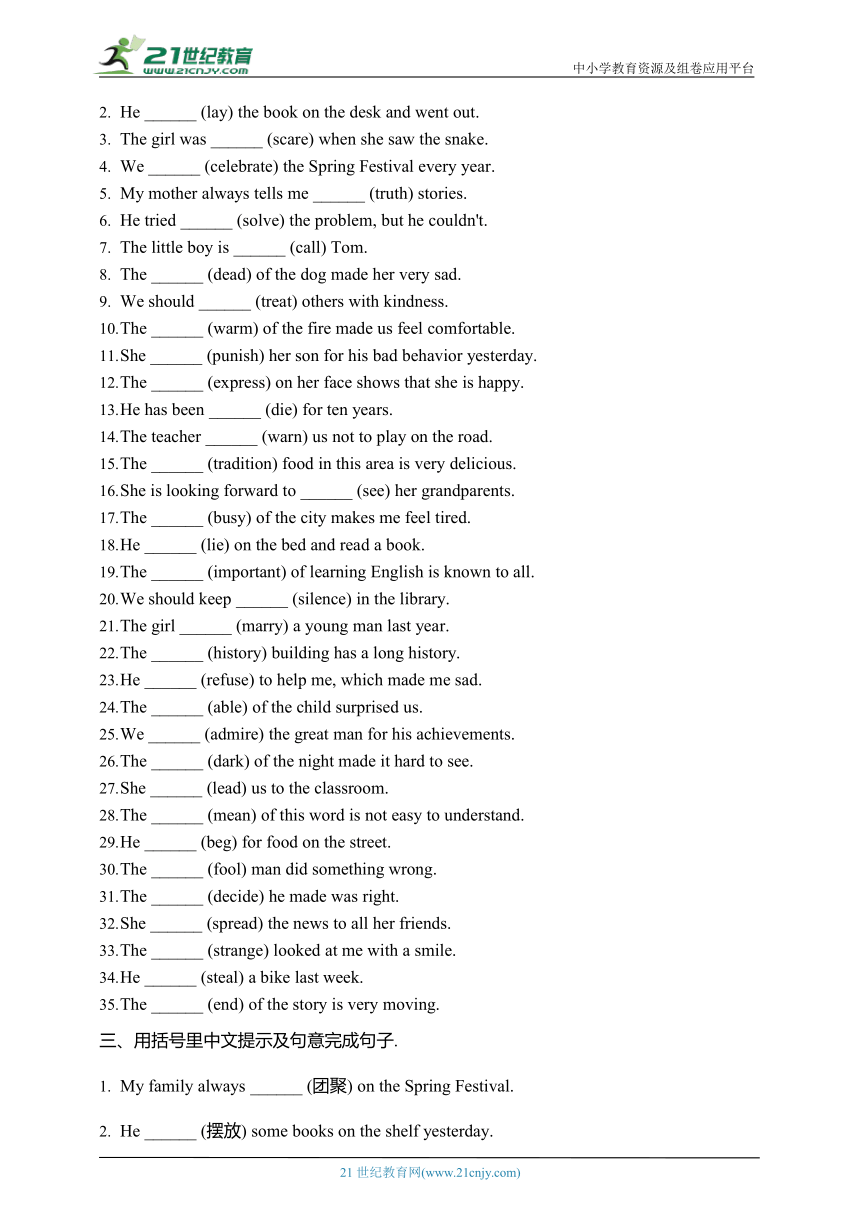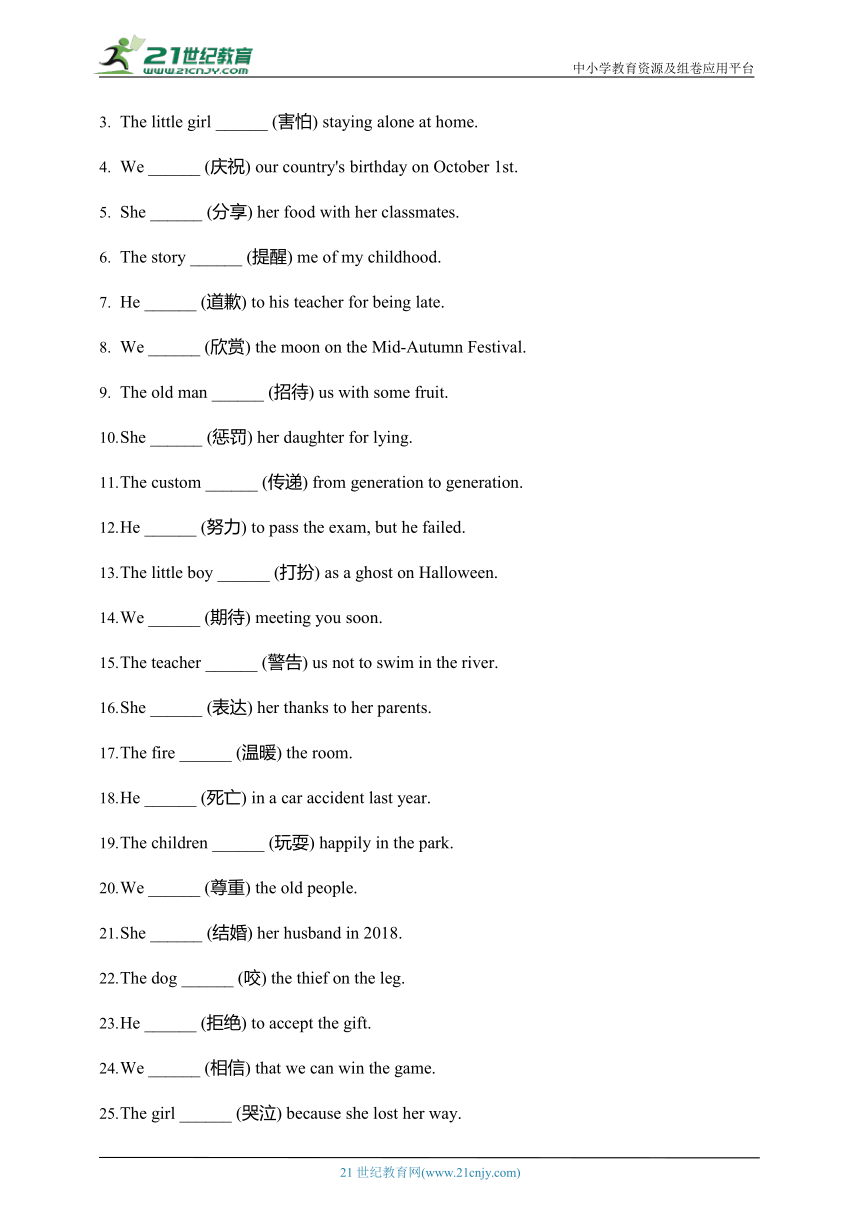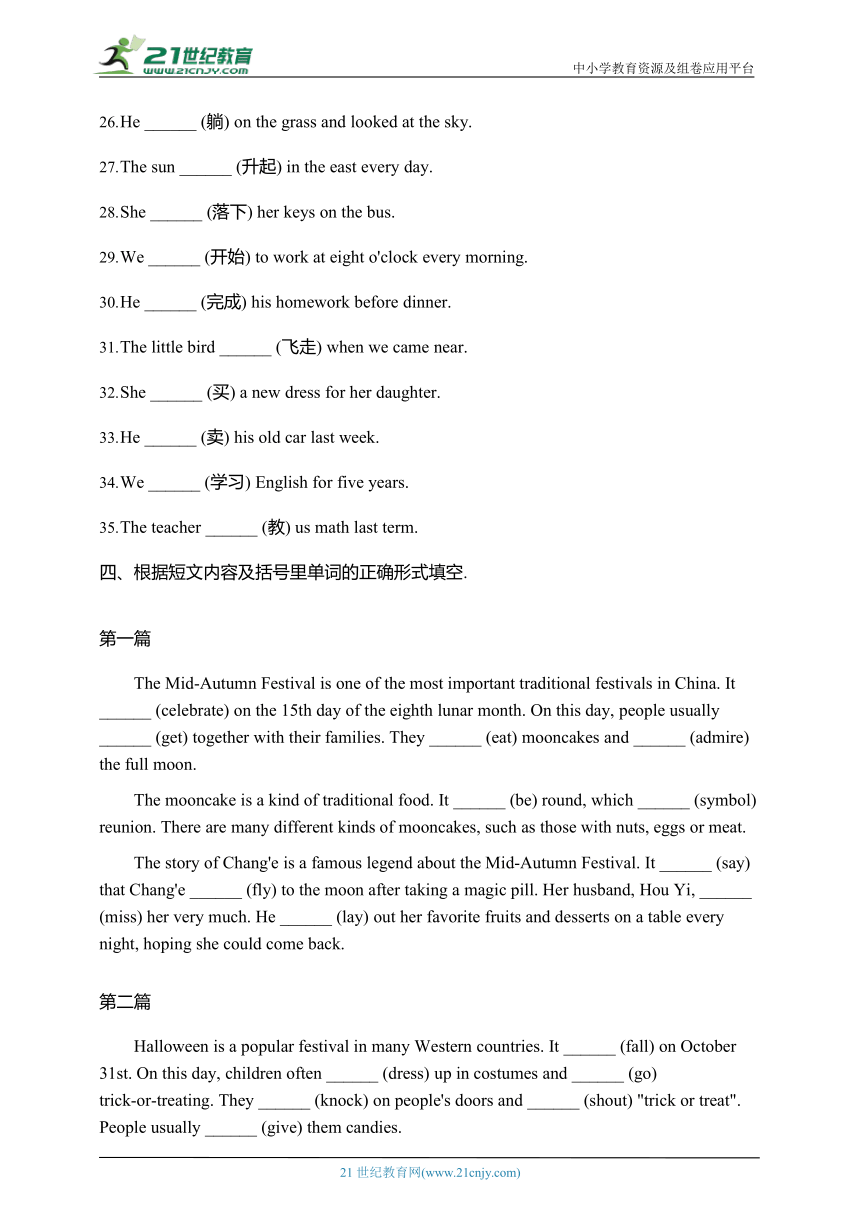Unit2词汇综合运用精练(含答案解析)人教新目标版九年级全册Unit 2 I think that mooncakes are delicious!
文档属性
| 名称 | Unit2词汇综合运用精练(含答案解析)人教新目标版九年级全册Unit 2 I think that mooncakes are delicious! |  | |
| 格式 | docx | ||
| 文件大小 | 55.2KB | ||
| 资源类型 | 试卷 | ||
| 版本资源 | 人教新目标(Go for it)版 | ||
| 科目 | 英语 | ||
| 更新时间 | 2025-08-04 10:13:21 | ||
图片预览




文档简介
中小学教育资源及组卷应用平台
人教新目标版九年级全册Unit2词汇综合运用精练
一、根据句子中首字母提示完成填空(30小题)
People usually eat m______ on the Mid-Autumn Festival.
The story of Chang'e is one of the traditional f______ in China.
He l______ out some fruits and desserts on the table to welcome his guests.
The old man t______ his grandchildren stories every night.
If you don't hurry, you'll m______ the early bus.
The little girl is a______ of the dark, so she always sleeps with the light on.
The Spring Festival is a time for family r______.
We usually a______ the moon and eat mooncakes on the Mid-Autumn Festival.
He tried his best to w______ the game, but he failed.
The custom of eating zongzi is c______ down from generation to generation.
I don't like the scary m______ movies.
She p______ to go shopping with me yesterday, but she didn't come.
The boy is so s______ that he can solve the difficult problem.
The s______ of the street is covered with snow.
He e______ his love for his mother by giving her a bunch of flowers.
The teacher p______ the students who did well in the exam.
The old photo r______ me of my happy childhood.
You should a______ to your parents for your mistake.
The m______ goes around the earth.
The thief s______ some money from the store last night.
We had a good time at the party, e______ the music and dance.
The little boy d______ up as a superhero on Halloween.
The Spring Festival Gala is a t______ program on CCTV every year.
He has a good m______ and can remember things easily.
The sun gives us light and h______.
She is wearing a beautiful d______ at the party.
The children are playing t______ in the park.
The old man is very kind and always helps the p______.
We should respect the t______ of other countries.
The dog is b______ at the stranger.
二、用括号里单词的正确形式完成句子.
I think that the story is very ______ (interest).
He ______ (lay) the book on the desk and went out.
The girl was ______ (scare) when she saw the snake.
We ______ (celebrate) the Spring Festival every year.
My mother always tells me ______ (truth) stories.
He tried ______ (solve) the problem, but he couldn't.
The little boy is ______ (call) Tom.
The ______ (dead) of the dog made her very sad.
We should ______ (treat) others with kindness.
The ______ (warm) of the fire made us feel comfortable.
She ______ (punish) her son for his bad behavior yesterday.
The ______ (express) on her face shows that she is happy.
He has been ______ (die) for ten years.
The teacher ______ (warn) us not to play on the road.
The ______ (tradition) food in this area is very delicious.
She is looking forward to ______ (see) her grandparents.
The ______ (busy) of the city makes me feel tired.
He ______ (lie) on the bed and read a book.
The ______ (important) of learning English is known to all.
We should keep ______ (silence) in the library.
The girl ______ (marry) a young man last year.
The ______ (history) building has a long history.
He ______ (refuse) to help me, which made me sad.
The ______ (able) of the child surprised us.
We ______ (admire) the great man for his achievements.
The ______ (dark) of the night made it hard to see.
She ______ (lead) us to the classroom.
The ______ (mean) of this word is not easy to understand.
He ______ (beg) for food on the street.
The ______ (fool) man did something wrong.
The ______ (decide) he made was right.
She ______ (spread) the news to all her friends.
The ______ (strange) looked at me with a smile.
He ______ (steal) a bike last week.
The ______ (end) of the story is very moving.
三、用括号里中文提示及句意完成句子.
My family always ______ (团聚) on the Spring Festival.
He ______ (摆放) some books on the shelf yesterday.
The little girl ______ (害怕) staying alone at home.
We ______ (庆祝) our country's birthday on October 1st.
She ______ (分享) her food with her classmates.
The story ______ (提醒) me of my childhood.
He ______ (道歉) to his teacher for being late.
We ______ (欣赏) the moon on the Mid-Autumn Festival.
The old man ______ (招待) us with some fruit.
She ______ (惩罚) her daughter for lying.
The custom ______ (传递) from generation to generation.
He ______ (努力) to pass the exam, but he failed.
The little boy ______ (打扮) as a ghost on Halloween.
We ______ (期待) meeting you soon.
The teacher ______ (警告) us not to swim in the river.
She ______ (表达) her thanks to her parents.
The fire ______ (温暖) the room.
He ______ (死亡) in a car accident last year.
The children ______ (玩耍) happily in the park.
We ______ (尊重) the old people.
She ______ (结婚) her husband in 2018.
The dog ______ (咬) the thief on the leg.
He ______ (拒绝) to accept the gift.
We ______ (相信) that we can win the game.
The girl ______ (哭泣) because she lost her way.
He ______ (躺) on the grass and looked at the sky.
The sun ______ (升起) in the east every day.
She ______ (落下) her keys on the bus.
We ______ (开始) to work at eight o'clock every morning.
He ______ (完成) his homework before dinner.
The little bird ______ (飞走) when we came near.
She ______ (买) a new dress for her daughter.
He ______ (卖) his old car last week.
We ______ (学习) English for five years.
The teacher ______ (教) us math last term.
四、根据短文内容及括号里单词的正确形式填空.
第一篇
The Mid-Autumn Festival is one of the most important traditional festivals in China. It ______ (celebrate) on the 15th day of the eighth lunar month. On this day, people usually ______ (get) together with their families. They ______ (eat) mooncakes and ______ (admire) the full moon.
The mooncake is a kind of traditional food. It ______ (be) round, which ______ (symbol) reunion. There are many different kinds of mooncakes, such as those with nuts, eggs or meat.
The story of Chang'e is a famous legend about the Mid-Autumn Festival. It ______ (say) that Chang'e ______ (fly) to the moon after taking a magic pill. Her husband, Hou Yi, ______ (miss) her very much. He ______ (lay) out her favorite fruits and desserts on a table every night, hoping she could come back.
第二篇
Halloween is a popular festival in many Western countries. It ______ (fall) on October 31st. On this day, children often ______ (dress) up in costumes and ______ (go) trick-or-treating. They ______ (knock) on people's doors and ______ (shout) "trick or treat". People usually ______ (give) them candies.
Adults also ______ (have) fun on Halloween. They sometimes ______ (attend) parties and ______ (play) games. Some people ______ (decorate) their houses with pumpkins and ghosts.
The origin of Halloween ______ (be) related to ancient festivals. People used to believe that on this day, the spirits of the dead ______ (return) to their homes. They ______ (light) bonfires and ______ (wear) costumes to scare away the evil spirits. Now, Halloween is more about fun and celebration.
Unit2词汇综合运用精练答案解析
一、根据句子中首字母提示完成填空(30小题)
mooncakes(解析:中秋节吃月饼是传统习俗,"mooncake"符合语境,此处用复数形式)
folk tales(解析:嫦娥的故事是中国传统民间故事,"folk tales"为固定搭配)
laid(解析:"lay out"表示“摆放”,结合语境用过去式"laid")
tells(解析:“讲故事”用"tell stories",主语是第三人称单数,用"tells")
miss(解析:“错过早班车”用"miss the bus",will后接动词原形)
afraid(解析:"be afraid of"是固定短语,意为“害怕……”)
reunions(解析:春节是家庭团聚的时刻,"reunion"用复数形式表示泛指)
admire(解析:“赏月”用"admire the moon",usually提示用一般现在时)
win(解析:“赢得比赛”用"win the game",try to后接动词原形)
passed(解析:"pass down"表示“传承”,此处用被动语态的过去分词)
monster(解析:“恐怖的怪兽电影”用"monster movies")
promised(解析:“答应做某事”用"promise to do",yesterday提示用过去式)
smart(解析:能解难题说明男孩“聪明”,"smart"符合语境)
surface(解析:“街道表面”用"surface of the street")
expressed(解析:“表达爱意”用"express love",结合语境用过去式)
praised(解析:“表扬学生”用"praise",此处用过去式表示过去的动作)
reminds(解析:"remind sb. of sth."表示“使某人想起某事”,主语是单数,用"reminds")
apologize(解析:“向父母道歉”用"apologize to parents",should后接动词原形)
moon(解析:“月亮绕地球转”是客观事实,"moon"符合句意)
stole(解析:“偷钱”用"steal",last night提示用过去式"stole")
especially(解析:“尤其喜欢音乐和舞蹈”用"especially"强调程度)
dressed(解析:"dress up as"表示“装扮成”,on Halloween提示用过去式)
traditional(解析:春晚是传统节目,"traditional"修饰名词"program")
memory(解析:“记忆力好”用"have a good memory")
heat(解析:太阳提供光和热,"heat"为不可数名词)
dress(解析:“在派对上穿裙子”用"dress",a后接单数形式)
tricks(解析:"play tricks"表示“玩恶作剧”,是固定短语)
poor(解析:“帮助穷人”用"help the poor","the+形容词"表示一类人)
traditions(解析:“尊重其他国家的传统”用复数"traditions")
barking(解析:“狗对着陌生人叫”用"bark",is后接现在分词表正在进行)
二、用括号里单词的正确形式完成句子(35小题)
interesting(解析:修饰物“story”用"interesting",表示“有趣的”)
laid(解析:"lay"的过去式是"laid",与"went"并列表示过去的动作)
scared(解析:修饰人“the girl”用"scared",表示“感到害怕的”)
celebrate(解析:every year提示用一般现在时,主语是we,用动词原形)
truthful(解析:修饰名词"stories"用形容词"truthful",表示“真实的”)
to solve(解析:"try to do sth."表示“努力做某事”,用不定式)
called(解析:被动语态“被叫做”,用过去分词"called")
death(解析:定冠词"the"后接名词,"dead"的名词形式是"death")
treat(解析:情态动词"should"后接动词原形)
warmth(解析:"warm"的名词形式是"warmth",表示“温暖”)
punished(解析:yesterday提示用过去式"punished")
expression(解析:"express"的名词形式是"expression",表示“表情”)
dead(解析:"be dead"表示状态,与时间段"for ten years"搭配)
warned(解析:结合语境用过去式,表示“警告过我们”)
traditional(解析:修饰名词"food"用形容词"traditional",表示“传统的”)
seeing(解析:"look forward to doing sth."表示“期待做某事”,用动名词)
busyness(解析:"busy"的名词形式是"busyness",表示“忙碌”)
lay(解析:"lie"表示“躺”时,过去式是"lay")
importance(解析:"important"的名词形式是"importance",表示“重要性”)
silent(解析:"keep silent"是固定短语,意为“保持安静”)
married(解析:"marry"的过去式是"married",last year提示用过去时)
historical(解析:修饰名词"building"用形容词"historical",表示“历史的”)
refused(解析:结合语境用过去式,表示“拒绝帮助我”)
ability(解析:"able"的名词形式是"ability",表示“能力”)
admire(解析:陈述事实用一般现在时,主语是we,用动词原形)
darkness(解析:"dark"的名词形式是"darkness",表示“黑暗”)
led(解析:"lead"的过去式是"led",结合语境用过去时)
meaning(解析:"mean"的名词形式是"meaning",表示“意思”)
begged(解析:结合语境用过去式,表示“在街头乞讨”)
foolish(解析:修饰名词"man"用形容词"foolish",表示“愚蠢的”)
decision(解析:"decide"的名词形式是"decision",表示“决定”)
spread(解析:"spread"的过去式与原形一致,此处用过去式)
stranger(解析:表示“陌生人”用名词"stranger",结合句意用单数)
stole(解析:"steal"的过去式是"stole",last week提示用过去时)
ending(解析:"end"的名词形式是"ending",表示“故事的结局”)
三、用括号里中文提示及句意完成句子(35小题)
get together(解析:“团聚”用"get together",always提示用一般现在时)
laid out(解析:“摆放”用"lay out",yesterday提示用过去式"laid out")
is afraid of(解析:“害怕做某事”用"be afraid of doing",主语是单数,用is)
celebrate(解析:“庆祝国庆节”用"celebrate",陈述事实用一般现在时)
shares(解析:“分享”用"share",主语是第三人称单数,用"shares")
reminds(解析:“提醒某人某事”用"remind sb. of sth.",主语是单数,用"reminds")
apologized(解析:“道歉”用"apologize",结合语境用过去式)
admire(解析:“赏月”用"admire the moon",陈述习俗用一般现在时)
treated(解析:“招待某人”用"treat sb.",结合语境用过去式)
punished(解析:“惩罚”用"punish",结合语境用过去式)
is passed down(解析:“被传承”用被动语态"be passed down")
tried(解析:“努力做某事”用"try to do",结合语境用过去式)
dressed up(解析:“装扮成”用"dress up as",on Halloween提示用过去式)
look forward to(解析:“期待”用"look forward to",主语是we,用动词原形)
warned(解析:“警告”用"warn",结合语境用过去式)
expressed(解析:“表达感谢”用"express thanks",结合语境用过去式)
warms(解析:“温暖房间”用"warm",主语是单数,用第三人称单数形式)
died(解析:“死亡”用"die",last year提示用过去式)
are playing(解析:“玩耍”用"play",结合语境用现在进行时)
respect(解析:“尊重”用"respect",陈述事实用一般现在时)
married(解析:“与某人结婚”用"marry sb.",in 2018提示用过去式)
bit(解析:“咬”用"bite",过去式是"bit",结合语境用过去时)
refused(解析:“拒绝”用"refuse",结合语境用过去式)
believe(解析:“相信”用"believe",主语是we,用动词原形)
cried(解析:“哭泣”用"cry",结合语境用过去式)
lay(解析:“躺”用"lie",过去式是"lay",结合语境用过去时)
rises(解析:“升起”用"rise",客观事实用一般现在时,主语是单数)
left(解析:“落下”用"leave",过去式是"left",结合语境用过去时)
start(解析:“开始工作”用"start to work",every morning提示用一般现在时)
finished(解析:“完成作业”用"finish homework",结合语境用过去式)
flew away(解析:“飞走”用"fly away",came提示用过去式"flew")
bought(解析:“买”用"buy",过去式是"bought",结合语境用过去时)
sold(解析:“卖”用"sell",过去式是"sold",last week提示用过去时)
have learned(解析:“学习五年”用现在完成时"have learned")
taught(解析:“教数学”用"teach math",last term提示用过去式"taught")
四、根据短文内容及括号里单词的正确形式填空.
第一篇
is celebrated(解析:中秋节被庆祝,用一般现在时的被动语态)
get(解析:陈述习俗用一般现在时,主语是people,用动词原形)
eat(解析:与"get"、"admire"并列,用一般现在时)
admire(解析:“赏月”是固定搭配,用一般现在时)
is(解析:主语"it"指代月饼,用单数is)
symbolizes(解析:“象征团圆”,主语是单数,用第三人称单数形式)
is said(解析:"it is said that"是固定句型,意为“据说”)
flew(解析:嫦娥奔月是过去的传说,用过去式"flew")
missed(解析:描述过去的动作,用过去式"missed")
laid(解析:"lay out"的过去式是"laid",与"missed"并列)
第二篇
falls(解析:万圣节在10月31日是客观事实,用一般现在时,主语是单数)
dress(解析:"dress up"表示“装扮”,陈述习俗用一般现在时)
go(解析:与"dress up"并列,用动词原形)
knock(解析:“敲门”是万圣节活动,用一般现在时)
shout(解析:与"knock"并列,用动词原形)
give(解析:“给糖果”是习惯,用一般现在时)
have(解析:“玩得开心”用"have fun",主语是adults,用动词原形)
attend(解析:与"have"、"play"并列,用动词原形)
play(解析:“玩游戏”用"play games",用一般现在时)
decorate(解析:描述人们的行为,用一般现在时)
is(解析:主语"origin"是单数,用is)
would return(解析:过去的信仰,用过去将来时表示“会回来”)
lit(解析:"light"的过去式是"lit",描述过去的行为)
wore(解析:与"lit"并列,用过去式"wore")
21世纪教育网 www.21cnjy.com 精品试卷·第 2 页 (共 2 页)
21世纪教育网(www.21cnjy.com)
人教新目标版九年级全册Unit2词汇综合运用精练
一、根据句子中首字母提示完成填空(30小题)
People usually eat m______ on the Mid-Autumn Festival.
The story of Chang'e is one of the traditional f______ in China.
He l______ out some fruits and desserts on the table to welcome his guests.
The old man t______ his grandchildren stories every night.
If you don't hurry, you'll m______ the early bus.
The little girl is a______ of the dark, so she always sleeps with the light on.
The Spring Festival is a time for family r______.
We usually a______ the moon and eat mooncakes on the Mid-Autumn Festival.
He tried his best to w______ the game, but he failed.
The custom of eating zongzi is c______ down from generation to generation.
I don't like the scary m______ movies.
She p______ to go shopping with me yesterday, but she didn't come.
The boy is so s______ that he can solve the difficult problem.
The s______ of the street is covered with snow.
He e______ his love for his mother by giving her a bunch of flowers.
The teacher p______ the students who did well in the exam.
The old photo r______ me of my happy childhood.
You should a______ to your parents for your mistake.
The m______ goes around the earth.
The thief s______ some money from the store last night.
We had a good time at the party, e______ the music and dance.
The little boy d______ up as a superhero on Halloween.
The Spring Festival Gala is a t______ program on CCTV every year.
He has a good m______ and can remember things easily.
The sun gives us light and h______.
She is wearing a beautiful d______ at the party.
The children are playing t______ in the park.
The old man is very kind and always helps the p______.
We should respect the t______ of other countries.
The dog is b______ at the stranger.
二、用括号里单词的正确形式完成句子.
I think that the story is very ______ (interest).
He ______ (lay) the book on the desk and went out.
The girl was ______ (scare) when she saw the snake.
We ______ (celebrate) the Spring Festival every year.
My mother always tells me ______ (truth) stories.
He tried ______ (solve) the problem, but he couldn't.
The little boy is ______ (call) Tom.
The ______ (dead) of the dog made her very sad.
We should ______ (treat) others with kindness.
The ______ (warm) of the fire made us feel comfortable.
She ______ (punish) her son for his bad behavior yesterday.
The ______ (express) on her face shows that she is happy.
He has been ______ (die) for ten years.
The teacher ______ (warn) us not to play on the road.
The ______ (tradition) food in this area is very delicious.
She is looking forward to ______ (see) her grandparents.
The ______ (busy) of the city makes me feel tired.
He ______ (lie) on the bed and read a book.
The ______ (important) of learning English is known to all.
We should keep ______ (silence) in the library.
The girl ______ (marry) a young man last year.
The ______ (history) building has a long history.
He ______ (refuse) to help me, which made me sad.
The ______ (able) of the child surprised us.
We ______ (admire) the great man for his achievements.
The ______ (dark) of the night made it hard to see.
She ______ (lead) us to the classroom.
The ______ (mean) of this word is not easy to understand.
He ______ (beg) for food on the street.
The ______ (fool) man did something wrong.
The ______ (decide) he made was right.
She ______ (spread) the news to all her friends.
The ______ (strange) looked at me with a smile.
He ______ (steal) a bike last week.
The ______ (end) of the story is very moving.
三、用括号里中文提示及句意完成句子.
My family always ______ (团聚) on the Spring Festival.
He ______ (摆放) some books on the shelf yesterday.
The little girl ______ (害怕) staying alone at home.
We ______ (庆祝) our country's birthday on October 1st.
She ______ (分享) her food with her classmates.
The story ______ (提醒) me of my childhood.
He ______ (道歉) to his teacher for being late.
We ______ (欣赏) the moon on the Mid-Autumn Festival.
The old man ______ (招待) us with some fruit.
She ______ (惩罚) her daughter for lying.
The custom ______ (传递) from generation to generation.
He ______ (努力) to pass the exam, but he failed.
The little boy ______ (打扮) as a ghost on Halloween.
We ______ (期待) meeting you soon.
The teacher ______ (警告) us not to swim in the river.
She ______ (表达) her thanks to her parents.
The fire ______ (温暖) the room.
He ______ (死亡) in a car accident last year.
The children ______ (玩耍) happily in the park.
We ______ (尊重) the old people.
She ______ (结婚) her husband in 2018.
The dog ______ (咬) the thief on the leg.
He ______ (拒绝) to accept the gift.
We ______ (相信) that we can win the game.
The girl ______ (哭泣) because she lost her way.
He ______ (躺) on the grass and looked at the sky.
The sun ______ (升起) in the east every day.
She ______ (落下) her keys on the bus.
We ______ (开始) to work at eight o'clock every morning.
He ______ (完成) his homework before dinner.
The little bird ______ (飞走) when we came near.
She ______ (买) a new dress for her daughter.
He ______ (卖) his old car last week.
We ______ (学习) English for five years.
The teacher ______ (教) us math last term.
四、根据短文内容及括号里单词的正确形式填空.
第一篇
The Mid-Autumn Festival is one of the most important traditional festivals in China. It ______ (celebrate) on the 15th day of the eighth lunar month. On this day, people usually ______ (get) together with their families. They ______ (eat) mooncakes and ______ (admire) the full moon.
The mooncake is a kind of traditional food. It ______ (be) round, which ______ (symbol) reunion. There are many different kinds of mooncakes, such as those with nuts, eggs or meat.
The story of Chang'e is a famous legend about the Mid-Autumn Festival. It ______ (say) that Chang'e ______ (fly) to the moon after taking a magic pill. Her husband, Hou Yi, ______ (miss) her very much. He ______ (lay) out her favorite fruits and desserts on a table every night, hoping she could come back.
第二篇
Halloween is a popular festival in many Western countries. It ______ (fall) on October 31st. On this day, children often ______ (dress) up in costumes and ______ (go) trick-or-treating. They ______ (knock) on people's doors and ______ (shout) "trick or treat". People usually ______ (give) them candies.
Adults also ______ (have) fun on Halloween. They sometimes ______ (attend) parties and ______ (play) games. Some people ______ (decorate) their houses with pumpkins and ghosts.
The origin of Halloween ______ (be) related to ancient festivals. People used to believe that on this day, the spirits of the dead ______ (return) to their homes. They ______ (light) bonfires and ______ (wear) costumes to scare away the evil spirits. Now, Halloween is more about fun and celebration.
Unit2词汇综合运用精练答案解析
一、根据句子中首字母提示完成填空(30小题)
mooncakes(解析:中秋节吃月饼是传统习俗,"mooncake"符合语境,此处用复数形式)
folk tales(解析:嫦娥的故事是中国传统民间故事,"folk tales"为固定搭配)
laid(解析:"lay out"表示“摆放”,结合语境用过去式"laid")
tells(解析:“讲故事”用"tell stories",主语是第三人称单数,用"tells")
miss(解析:“错过早班车”用"miss the bus",will后接动词原形)
afraid(解析:"be afraid of"是固定短语,意为“害怕……”)
reunions(解析:春节是家庭团聚的时刻,"reunion"用复数形式表示泛指)
admire(解析:“赏月”用"admire the moon",usually提示用一般现在时)
win(解析:“赢得比赛”用"win the game",try to后接动词原形)
passed(解析:"pass down"表示“传承”,此处用被动语态的过去分词)
monster(解析:“恐怖的怪兽电影”用"monster movies")
promised(解析:“答应做某事”用"promise to do",yesterday提示用过去式)
smart(解析:能解难题说明男孩“聪明”,"smart"符合语境)
surface(解析:“街道表面”用"surface of the street")
expressed(解析:“表达爱意”用"express love",结合语境用过去式)
praised(解析:“表扬学生”用"praise",此处用过去式表示过去的动作)
reminds(解析:"remind sb. of sth."表示“使某人想起某事”,主语是单数,用"reminds")
apologize(解析:“向父母道歉”用"apologize to parents",should后接动词原形)
moon(解析:“月亮绕地球转”是客观事实,"moon"符合句意)
stole(解析:“偷钱”用"steal",last night提示用过去式"stole")
especially(解析:“尤其喜欢音乐和舞蹈”用"especially"强调程度)
dressed(解析:"dress up as"表示“装扮成”,on Halloween提示用过去式)
traditional(解析:春晚是传统节目,"traditional"修饰名词"program")
memory(解析:“记忆力好”用"have a good memory")
heat(解析:太阳提供光和热,"heat"为不可数名词)
dress(解析:“在派对上穿裙子”用"dress",a后接单数形式)
tricks(解析:"play tricks"表示“玩恶作剧”,是固定短语)
poor(解析:“帮助穷人”用"help the poor","the+形容词"表示一类人)
traditions(解析:“尊重其他国家的传统”用复数"traditions")
barking(解析:“狗对着陌生人叫”用"bark",is后接现在分词表正在进行)
二、用括号里单词的正确形式完成句子(35小题)
interesting(解析:修饰物“story”用"interesting",表示“有趣的”)
laid(解析:"lay"的过去式是"laid",与"went"并列表示过去的动作)
scared(解析:修饰人“the girl”用"scared",表示“感到害怕的”)
celebrate(解析:every year提示用一般现在时,主语是we,用动词原形)
truthful(解析:修饰名词"stories"用形容词"truthful",表示“真实的”)
to solve(解析:"try to do sth."表示“努力做某事”,用不定式)
called(解析:被动语态“被叫做”,用过去分词"called")
death(解析:定冠词"the"后接名词,"dead"的名词形式是"death")
treat(解析:情态动词"should"后接动词原形)
warmth(解析:"warm"的名词形式是"warmth",表示“温暖”)
punished(解析:yesterday提示用过去式"punished")
expression(解析:"express"的名词形式是"expression",表示“表情”)
dead(解析:"be dead"表示状态,与时间段"for ten years"搭配)
warned(解析:结合语境用过去式,表示“警告过我们”)
traditional(解析:修饰名词"food"用形容词"traditional",表示“传统的”)
seeing(解析:"look forward to doing sth."表示“期待做某事”,用动名词)
busyness(解析:"busy"的名词形式是"busyness",表示“忙碌”)
lay(解析:"lie"表示“躺”时,过去式是"lay")
importance(解析:"important"的名词形式是"importance",表示“重要性”)
silent(解析:"keep silent"是固定短语,意为“保持安静”)
married(解析:"marry"的过去式是"married",last year提示用过去时)
historical(解析:修饰名词"building"用形容词"historical",表示“历史的”)
refused(解析:结合语境用过去式,表示“拒绝帮助我”)
ability(解析:"able"的名词形式是"ability",表示“能力”)
admire(解析:陈述事实用一般现在时,主语是we,用动词原形)
darkness(解析:"dark"的名词形式是"darkness",表示“黑暗”)
led(解析:"lead"的过去式是"led",结合语境用过去时)
meaning(解析:"mean"的名词形式是"meaning",表示“意思”)
begged(解析:结合语境用过去式,表示“在街头乞讨”)
foolish(解析:修饰名词"man"用形容词"foolish",表示“愚蠢的”)
decision(解析:"decide"的名词形式是"decision",表示“决定”)
spread(解析:"spread"的过去式与原形一致,此处用过去式)
stranger(解析:表示“陌生人”用名词"stranger",结合句意用单数)
stole(解析:"steal"的过去式是"stole",last week提示用过去时)
ending(解析:"end"的名词形式是"ending",表示“故事的结局”)
三、用括号里中文提示及句意完成句子(35小题)
get together(解析:“团聚”用"get together",always提示用一般现在时)
laid out(解析:“摆放”用"lay out",yesterday提示用过去式"laid out")
is afraid of(解析:“害怕做某事”用"be afraid of doing",主语是单数,用is)
celebrate(解析:“庆祝国庆节”用"celebrate",陈述事实用一般现在时)
shares(解析:“分享”用"share",主语是第三人称单数,用"shares")
reminds(解析:“提醒某人某事”用"remind sb. of sth.",主语是单数,用"reminds")
apologized(解析:“道歉”用"apologize",结合语境用过去式)
admire(解析:“赏月”用"admire the moon",陈述习俗用一般现在时)
treated(解析:“招待某人”用"treat sb.",结合语境用过去式)
punished(解析:“惩罚”用"punish",结合语境用过去式)
is passed down(解析:“被传承”用被动语态"be passed down")
tried(解析:“努力做某事”用"try to do",结合语境用过去式)
dressed up(解析:“装扮成”用"dress up as",on Halloween提示用过去式)
look forward to(解析:“期待”用"look forward to",主语是we,用动词原形)
warned(解析:“警告”用"warn",结合语境用过去式)
expressed(解析:“表达感谢”用"express thanks",结合语境用过去式)
warms(解析:“温暖房间”用"warm",主语是单数,用第三人称单数形式)
died(解析:“死亡”用"die",last year提示用过去式)
are playing(解析:“玩耍”用"play",结合语境用现在进行时)
respect(解析:“尊重”用"respect",陈述事实用一般现在时)
married(解析:“与某人结婚”用"marry sb.",in 2018提示用过去式)
bit(解析:“咬”用"bite",过去式是"bit",结合语境用过去时)
refused(解析:“拒绝”用"refuse",结合语境用过去式)
believe(解析:“相信”用"believe",主语是we,用动词原形)
cried(解析:“哭泣”用"cry",结合语境用过去式)
lay(解析:“躺”用"lie",过去式是"lay",结合语境用过去时)
rises(解析:“升起”用"rise",客观事实用一般现在时,主语是单数)
left(解析:“落下”用"leave",过去式是"left",结合语境用过去时)
start(解析:“开始工作”用"start to work",every morning提示用一般现在时)
finished(解析:“完成作业”用"finish homework",结合语境用过去式)
flew away(解析:“飞走”用"fly away",came提示用过去式"flew")
bought(解析:“买”用"buy",过去式是"bought",结合语境用过去时)
sold(解析:“卖”用"sell",过去式是"sold",last week提示用过去时)
have learned(解析:“学习五年”用现在完成时"have learned")
taught(解析:“教数学”用"teach math",last term提示用过去式"taught")
四、根据短文内容及括号里单词的正确形式填空.
第一篇
is celebrated(解析:中秋节被庆祝,用一般现在时的被动语态)
get(解析:陈述习俗用一般现在时,主语是people,用动词原形)
eat(解析:与"get"、"admire"并列,用一般现在时)
admire(解析:“赏月”是固定搭配,用一般现在时)
is(解析:主语"it"指代月饼,用单数is)
symbolizes(解析:“象征团圆”,主语是单数,用第三人称单数形式)
is said(解析:"it is said that"是固定句型,意为“据说”)
flew(解析:嫦娥奔月是过去的传说,用过去式"flew")
missed(解析:描述过去的动作,用过去式"missed")
laid(解析:"lay out"的过去式是"laid",与"missed"并列)
第二篇
falls(解析:万圣节在10月31日是客观事实,用一般现在时,主语是单数)
dress(解析:"dress up"表示“装扮”,陈述习俗用一般现在时)
go(解析:与"dress up"并列,用动词原形)
knock(解析:“敲门”是万圣节活动,用一般现在时)
shout(解析:与"knock"并列,用动词原形)
give(解析:“给糖果”是习惯,用一般现在时)
have(解析:“玩得开心”用"have fun",主语是adults,用动词原形)
attend(解析:与"have"、"play"并列,用动词原形)
play(解析:“玩游戏”用"play games",用一般现在时)
decorate(解析:描述人们的行为,用一般现在时)
is(解析:主语"origin"是单数,用is)
would return(解析:过去的信仰,用过去将来时表示“会回来”)
lit(解析:"light"的过去式是"lit",描述过去的行为)
wore(解析:与"lit"并列,用过去式"wore")
21世纪教育网 www.21cnjy.com 精品试卷·第 2 页 (共 2 页)
21世纪教育网(www.21cnjy.com)
同课章节目录
- Unit 1 How can we become good learners.
- Section A
- Section B
- Unit 2 I think that mooncakes are delicious!
- Section A
- Section B
- Unit 3 Could you please tell me where the restroom
- Section A
- Section B
- Unit 4 I used to be afraid of the dark.
- Section A
- Section B
- Unit 5 What are the shirts made of?
- Section A
- Section B
- Review of Units 1-5
- Unit 6 When was it invented?
- Section A
- Section B
- Unit 7 Teenagers should be allowed to choose their
- Section A
- Section B
- Unit 8 It must belong to Carla.
- Section A
- Section B
- Unit 9 I like music that I can dance to.
- Section A
- Section B
- Unit 10 You're supposed to shake hands.
- Section A
- Section B
- Review of Units 6-10
- Unit 11 Sad movies make me cry.
- Section A
- Section B
- Unit 12 Life is full of the unexpected
- Section A
- Section B
- Unit 13 We're trying to save the earth!
- Section A
- Section B
- Unit 14 I remember meeting all of you in Grade 7.
- Section A
- Section B
- Review of Units 11-14
